The Impact of Florence Nightingale's Quote on Nursing Skills
VerifiedAdded on 2023/04/20
|6
|1811
|81
AI Summary
This reflective essay explores the impact of Florence Nightingale's quote on nursing skills and emphasizes the importance of teamwork, leadership, and effective communication in providing quality patient care.
Contribute Materials
Your contribution can guide someone’s learning journey. Share your
documents today.
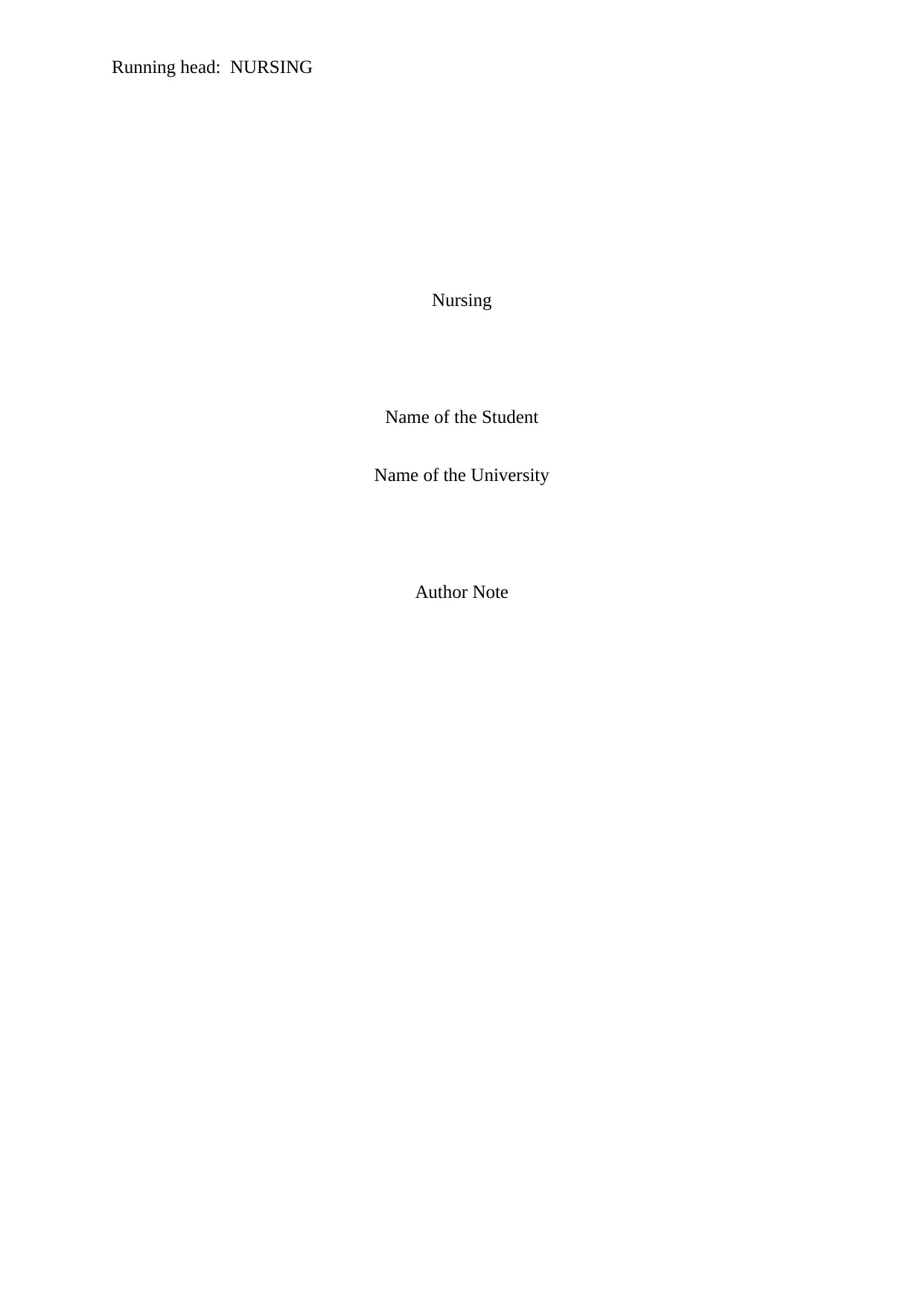
Running head: NURSING
Nursing
Name of the Student
Name of the University
Author Note
Nursing
Name of the Student
Name of the University
Author Note
Secure Best Marks with AI Grader
Need help grading? Try our AI Grader for instant feedback on your assignments.
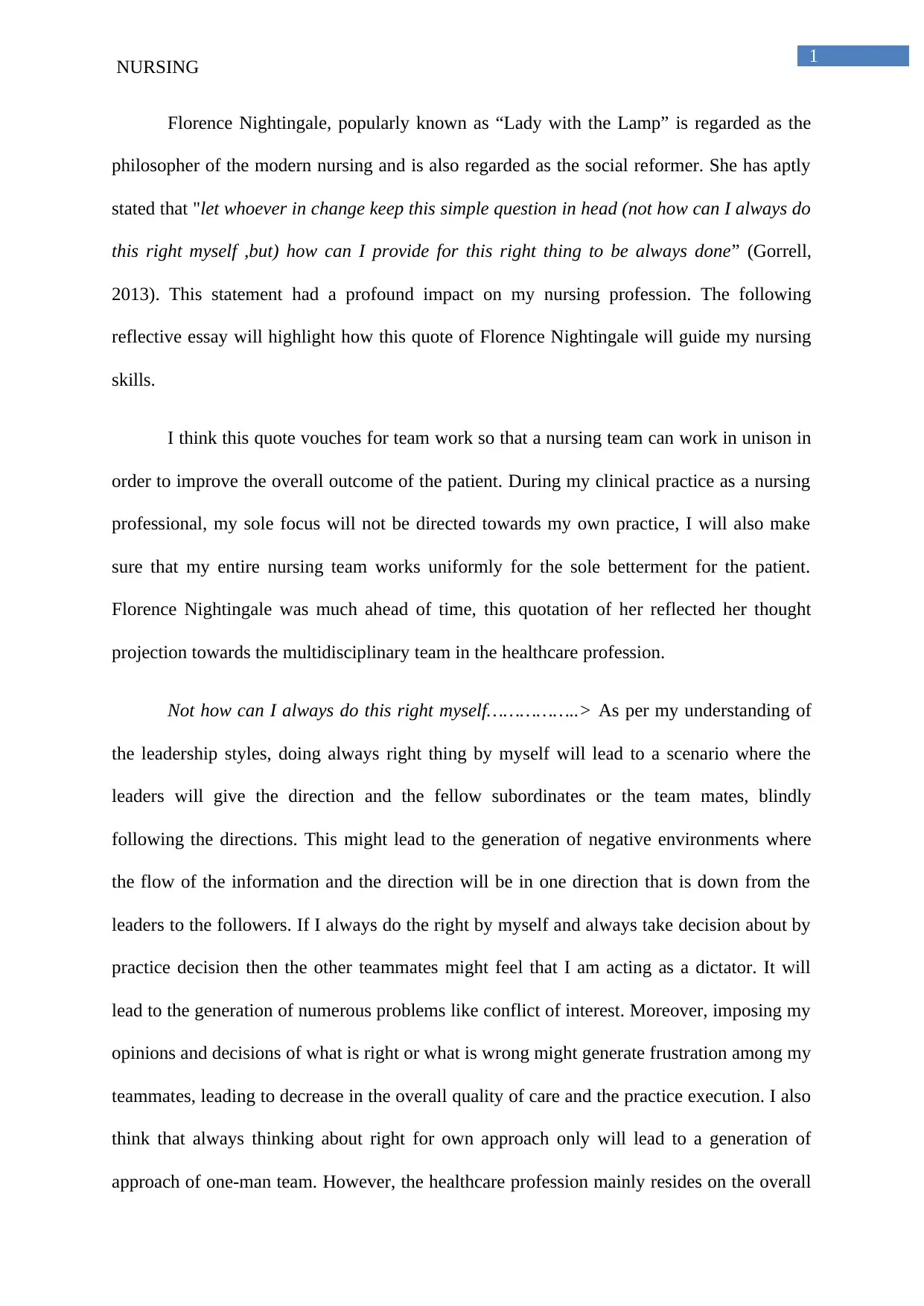
1
NURSING
Florence Nightingale, popularly known as “Lady with the Lamp” is regarded as the
philosopher of the modern nursing and is also regarded as the social reformer. She has aptly
stated that "let whoever in change keep this simple question in head (not how can I always do
this right myself ,but) how can I provide for this right thing to be always done” (Gorrell,
2013). This statement had a profound impact on my nursing profession. The following
reflective essay will highlight how this quote of Florence Nightingale will guide my nursing
skills.
I think this quote vouches for team work so that a nursing team can work in unison in
order to improve the overall outcome of the patient. During my clinical practice as a nursing
professional, my sole focus will not be directed towards my own practice, I will also make
sure that my entire nursing team works uniformly for the sole betterment for the patient.
Florence Nightingale was much ahead of time, this quotation of her reflected her thought
projection towards the multidisciplinary team in the healthcare profession.
Not how can I always do this right myself……………..> As per my understanding of
the leadership styles, doing always right thing by myself will lead to a scenario where the
leaders will give the direction and the fellow subordinates or the team mates, blindly
following the directions. This might lead to the generation of negative environments where
the flow of the information and the direction will be in one direction that is down from the
leaders to the followers. If I always do the right by myself and always take decision about by
practice decision then the other teammates might feel that I am acting as a dictator. It will
lead to the generation of numerous problems like conflict of interest. Moreover, imposing my
opinions and decisions of what is right or what is wrong might generate frustration among my
teammates, leading to decrease in the overall quality of care and the practice execution. I also
think that always thinking about right for own approach only will lead to a generation of
approach of one-man team. However, the healthcare profession mainly resides on the overall
NURSING
Florence Nightingale, popularly known as “Lady with the Lamp” is regarded as the
philosopher of the modern nursing and is also regarded as the social reformer. She has aptly
stated that "let whoever in change keep this simple question in head (not how can I always do
this right myself ,but) how can I provide for this right thing to be always done” (Gorrell,
2013). This statement had a profound impact on my nursing profession. The following
reflective essay will highlight how this quote of Florence Nightingale will guide my nursing
skills.
I think this quote vouches for team work so that a nursing team can work in unison in
order to improve the overall outcome of the patient. During my clinical practice as a nursing
professional, my sole focus will not be directed towards my own practice, I will also make
sure that my entire nursing team works uniformly for the sole betterment for the patient.
Florence Nightingale was much ahead of time, this quotation of her reflected her thought
projection towards the multidisciplinary team in the healthcare profession.
Not how can I always do this right myself……………..> As per my understanding of
the leadership styles, doing always right thing by myself will lead to a scenario where the
leaders will give the direction and the fellow subordinates or the team mates, blindly
following the directions. This might lead to the generation of negative environments where
the flow of the information and the direction will be in one direction that is down from the
leaders to the followers. If I always do the right by myself and always take decision about by
practice decision then the other teammates might feel that I am acting as a dictator. It will
lead to the generation of numerous problems like conflict of interest. Moreover, imposing my
opinions and decisions of what is right or what is wrong might generate frustration among my
teammates, leading to decrease in the overall quality of care and the practice execution. I also
think that always thinking about right for own approach only will lead to a generation of
approach of one-man team. However, the healthcare profession mainly resides on the overall
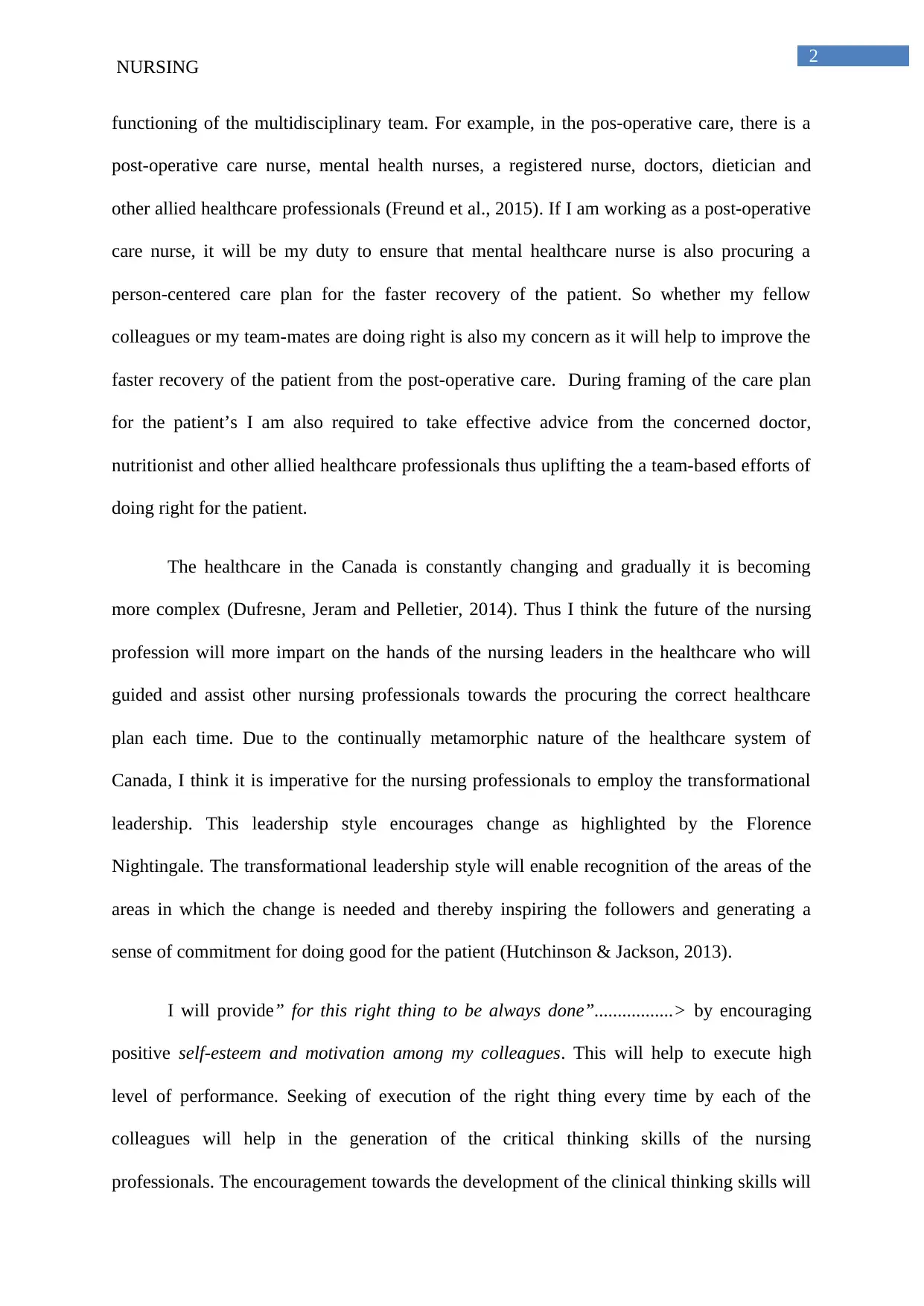
2
NURSING
functioning of the multidisciplinary team. For example, in the pos-operative care, there is a
post-operative care nurse, mental health nurses, a registered nurse, doctors, dietician and
other allied healthcare professionals (Freund et al., 2015). If I am working as a post-operative
care nurse, it will be my duty to ensure that mental healthcare nurse is also procuring a
person-centered care plan for the faster recovery of the patient. So whether my fellow
colleagues or my team-mates are doing right is also my concern as it will help to improve the
faster recovery of the patient from the post-operative care. During framing of the care plan
for the patient’s I am also required to take effective advice from the concerned doctor,
nutritionist and other allied healthcare professionals thus uplifting the a team-based efforts of
doing right for the patient.
The healthcare in the Canada is constantly changing and gradually it is becoming
more complex (Dufresne, Jeram and Pelletier, 2014). Thus I think the future of the nursing
profession will more impart on the hands of the nursing leaders in the healthcare who will
guided and assist other nursing professionals towards the procuring the correct healthcare
plan each time. Due to the continually metamorphic nature of the healthcare system of
Canada, I think it is imperative for the nursing professionals to employ the transformational
leadership. This leadership style encourages change as highlighted by the Florence
Nightingale. The transformational leadership style will enable recognition of the areas of the
areas in which the change is needed and thereby inspiring the followers and generating a
sense of commitment for doing good for the patient (Hutchinson & Jackson, 2013).
I will provide” for this right thing to be always done”.................> by encouraging
positive self-esteem and motivation among my colleagues. This will help to execute high
level of performance. Seeking of execution of the right thing every time by each of the
colleagues will help in the generation of the critical thinking skills of the nursing
professionals. The encouragement towards the development of the clinical thinking skills will
NURSING
functioning of the multidisciplinary team. For example, in the pos-operative care, there is a
post-operative care nurse, mental health nurses, a registered nurse, doctors, dietician and
other allied healthcare professionals (Freund et al., 2015). If I am working as a post-operative
care nurse, it will be my duty to ensure that mental healthcare nurse is also procuring a
person-centered care plan for the faster recovery of the patient. So whether my fellow
colleagues or my team-mates are doing right is also my concern as it will help to improve the
faster recovery of the patient from the post-operative care. During framing of the care plan
for the patient’s I am also required to take effective advice from the concerned doctor,
nutritionist and other allied healthcare professionals thus uplifting the a team-based efforts of
doing right for the patient.
The healthcare in the Canada is constantly changing and gradually it is becoming
more complex (Dufresne, Jeram and Pelletier, 2014). Thus I think the future of the nursing
profession will more impart on the hands of the nursing leaders in the healthcare who will
guided and assist other nursing professionals towards the procuring the correct healthcare
plan each time. Due to the continually metamorphic nature of the healthcare system of
Canada, I think it is imperative for the nursing professionals to employ the transformational
leadership. This leadership style encourages change as highlighted by the Florence
Nightingale. The transformational leadership style will enable recognition of the areas of the
areas in which the change is needed and thereby inspiring the followers and generating a
sense of commitment for doing good for the patient (Hutchinson & Jackson, 2013).
I will provide” for this right thing to be always done”.................> by encouraging
positive self-esteem and motivation among my colleagues. This will help to execute high
level of performance. Seeking of execution of the right thing every time by each of the
colleagues will help in the generation of the critical thinking skills of the nursing
professionals. The encouragement towards the development of the clinical thinking skills will
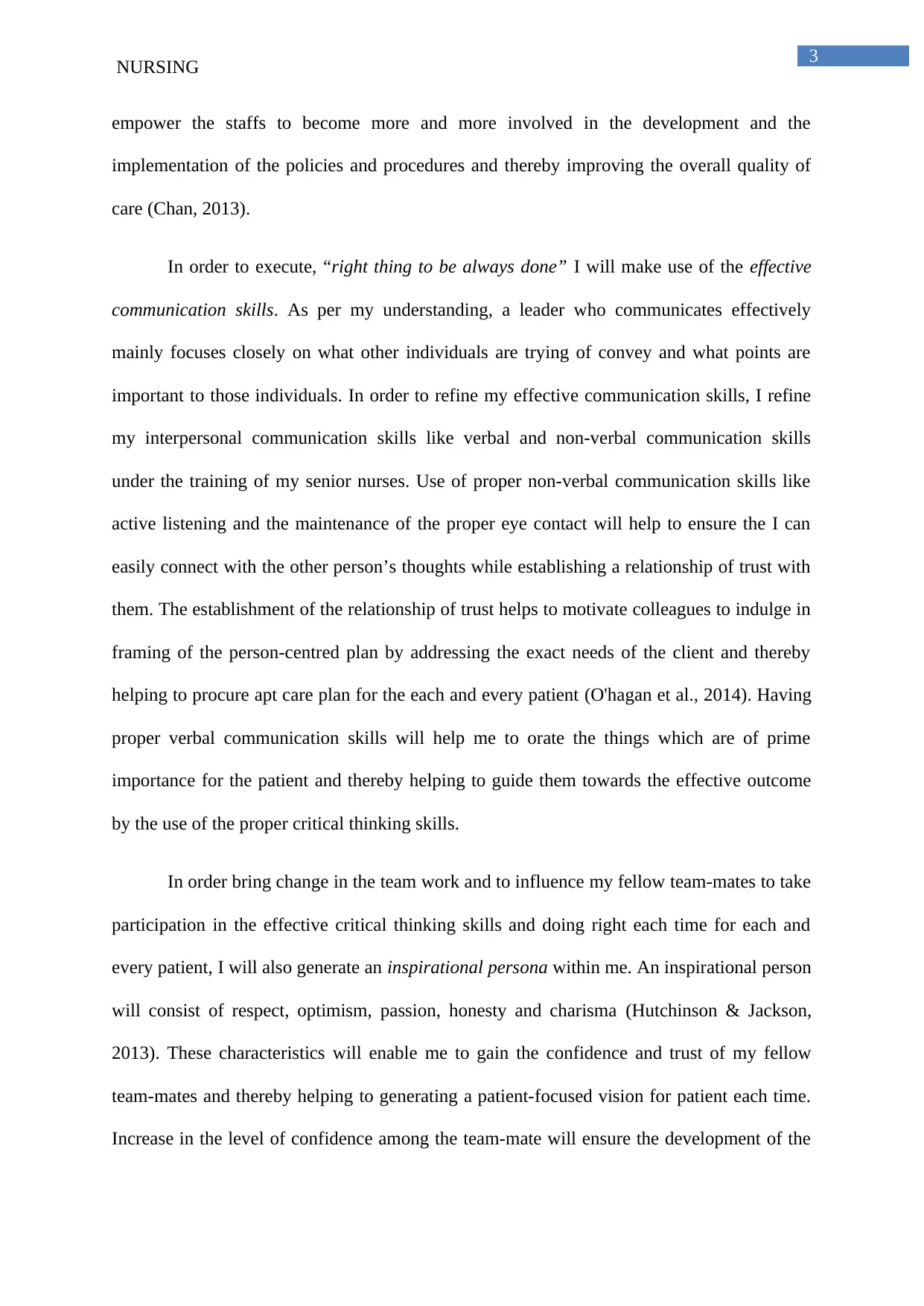
3
NURSING
empower the staffs to become more and more involved in the development and the
implementation of the policies and procedures and thereby improving the overall quality of
care (Chan, 2013).
In order to execute, “right thing to be always done” I will make use of the effective
communication skills. As per my understanding, a leader who communicates effectively
mainly focuses closely on what other individuals are trying of convey and what points are
important to those individuals. In order to refine my effective communication skills, I refine
my interpersonal communication skills like verbal and non-verbal communication skills
under the training of my senior nurses. Use of proper non-verbal communication skills like
active listening and the maintenance of the proper eye contact will help to ensure the I can
easily connect with the other person’s thoughts while establishing a relationship of trust with
them. The establishment of the relationship of trust helps to motivate colleagues to indulge in
framing of the person-centred plan by addressing the exact needs of the client and thereby
helping to procure apt care plan for the each and every patient (O'hagan et al., 2014). Having
proper verbal communication skills will help me to orate the things which are of prime
importance for the patient and thereby helping to guide them towards the effective outcome
by the use of the proper critical thinking skills.
In order bring change in the team work and to influence my fellow team-mates to take
participation in the effective critical thinking skills and doing right each time for each and
every patient, I will also generate an inspirational persona within me. An inspirational person
will consist of respect, optimism, passion, honesty and charisma (Hutchinson & Jackson,
2013). These characteristics will enable me to gain the confidence and trust of my fellow
team-mates and thereby helping to generating a patient-focused vision for patient each time.
Increase in the level of confidence among the team-mate will ensure the development of the
NURSING
empower the staffs to become more and more involved in the development and the
implementation of the policies and procedures and thereby improving the overall quality of
care (Chan, 2013).
In order to execute, “right thing to be always done” I will make use of the effective
communication skills. As per my understanding, a leader who communicates effectively
mainly focuses closely on what other individuals are trying of convey and what points are
important to those individuals. In order to refine my effective communication skills, I refine
my interpersonal communication skills like verbal and non-verbal communication skills
under the training of my senior nurses. Use of proper non-verbal communication skills like
active listening and the maintenance of the proper eye contact will help to ensure the I can
easily connect with the other person’s thoughts while establishing a relationship of trust with
them. The establishment of the relationship of trust helps to motivate colleagues to indulge in
framing of the person-centred plan by addressing the exact needs of the client and thereby
helping to procure apt care plan for the each and every patient (O'hagan et al., 2014). Having
proper verbal communication skills will help me to orate the things which are of prime
importance for the patient and thereby helping to guide them towards the effective outcome
by the use of the proper critical thinking skills.
In order bring change in the team work and to influence my fellow team-mates to take
participation in the effective critical thinking skills and doing right each time for each and
every patient, I will also generate an inspirational persona within me. An inspirational person
will consist of respect, optimism, passion, honesty and charisma (Hutchinson & Jackson,
2013). These characteristics will enable me to gain the confidence and trust of my fellow
team-mates and thereby helping to generating a patient-focused vision for patient each time.
Increase in the level of confidence among the team-mate will ensure the development of the
Secure Best Marks with AI Grader
Need help grading? Try our AI Grader for instant feedback on your assignments.
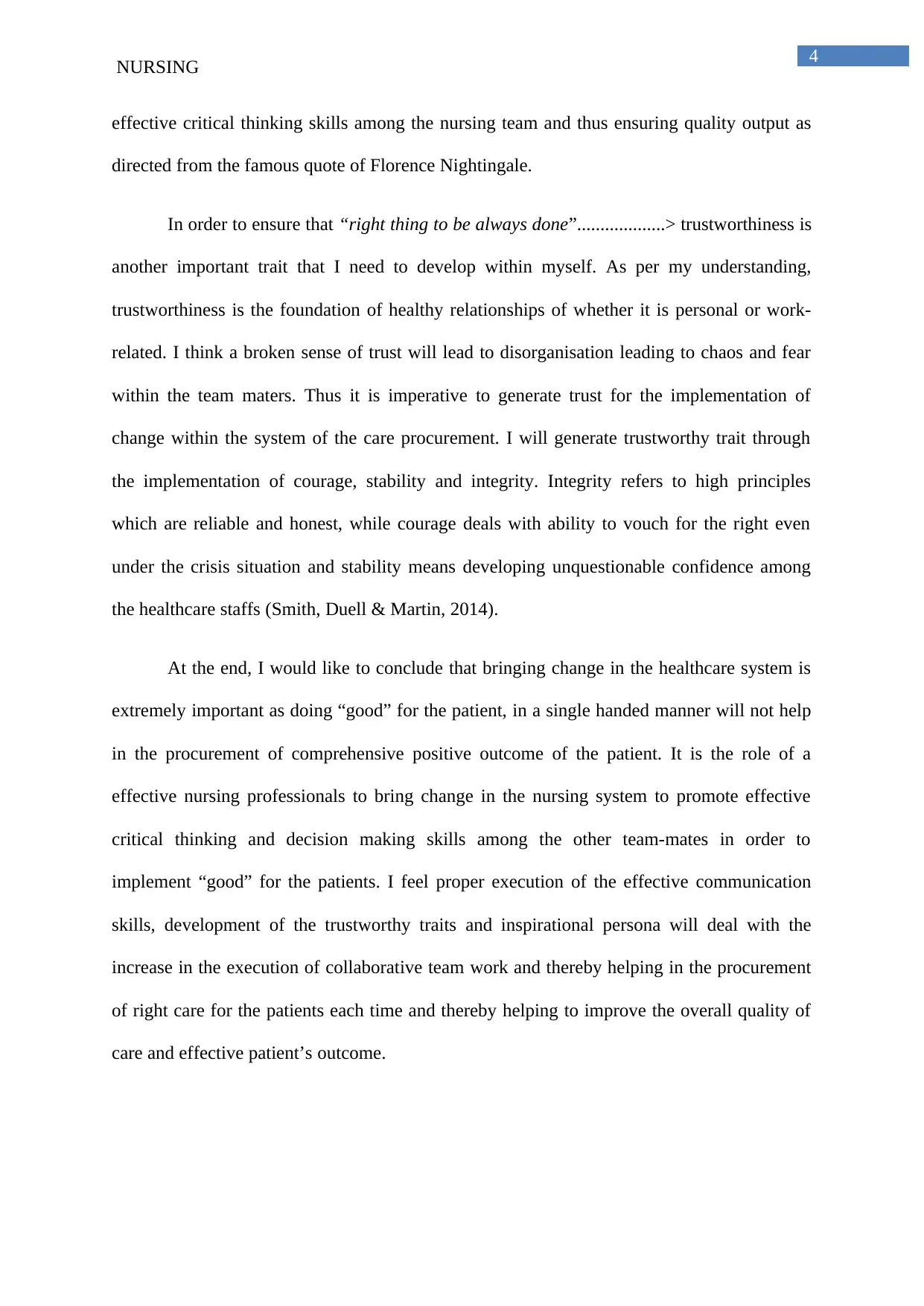
4
NURSING
effective critical thinking skills among the nursing team and thus ensuring quality output as
directed from the famous quote of Florence Nightingale.
In order to ensure that “right thing to be always done”...................> trustworthiness is
another important trait that I need to develop within myself. As per my understanding,
trustworthiness is the foundation of healthy relationships of whether it is personal or work-
related. I think a broken sense of trust will lead to disorganisation leading to chaos and fear
within the team maters. Thus it is imperative to generate trust for the implementation of
change within the system of the care procurement. I will generate trustworthy trait through
the implementation of courage, stability and integrity. Integrity refers to high principles
which are reliable and honest, while courage deals with ability to vouch for the right even
under the crisis situation and stability means developing unquestionable confidence among
the healthcare staffs (Smith, Duell & Martin, 2014).
At the end, I would like to conclude that bringing change in the healthcare system is
extremely important as doing “good” for the patient, in a single handed manner will not help
in the procurement of comprehensive positive outcome of the patient. It is the role of a
effective nursing professionals to bring change in the nursing system to promote effective
critical thinking and decision making skills among the other team-mates in order to
implement “good” for the patients. I feel proper execution of the effective communication
skills, development of the trustworthy traits and inspirational persona will deal with the
increase in the execution of collaborative team work and thereby helping in the procurement
of right care for the patients each time and thereby helping to improve the overall quality of
care and effective patient’s outcome.
NURSING
effective critical thinking skills among the nursing team and thus ensuring quality output as
directed from the famous quote of Florence Nightingale.
In order to ensure that “right thing to be always done”...................> trustworthiness is
another important trait that I need to develop within myself. As per my understanding,
trustworthiness is the foundation of healthy relationships of whether it is personal or work-
related. I think a broken sense of trust will lead to disorganisation leading to chaos and fear
within the team maters. Thus it is imperative to generate trust for the implementation of
change within the system of the care procurement. I will generate trustworthy trait through
the implementation of courage, stability and integrity. Integrity refers to high principles
which are reliable and honest, while courage deals with ability to vouch for the right even
under the crisis situation and stability means developing unquestionable confidence among
the healthcare staffs (Smith, Duell & Martin, 2014).
At the end, I would like to conclude that bringing change in the healthcare system is
extremely important as doing “good” for the patient, in a single handed manner will not help
in the procurement of comprehensive positive outcome of the patient. It is the role of a
effective nursing professionals to bring change in the nursing system to promote effective
critical thinking and decision making skills among the other team-mates in order to
implement “good” for the patients. I feel proper execution of the effective communication
skills, development of the trustworthy traits and inspirational persona will deal with the
increase in the execution of collaborative team work and thereby helping in the procurement
of right care for the patients each time and thereby helping to improve the overall quality of
care and effective patient’s outcome.
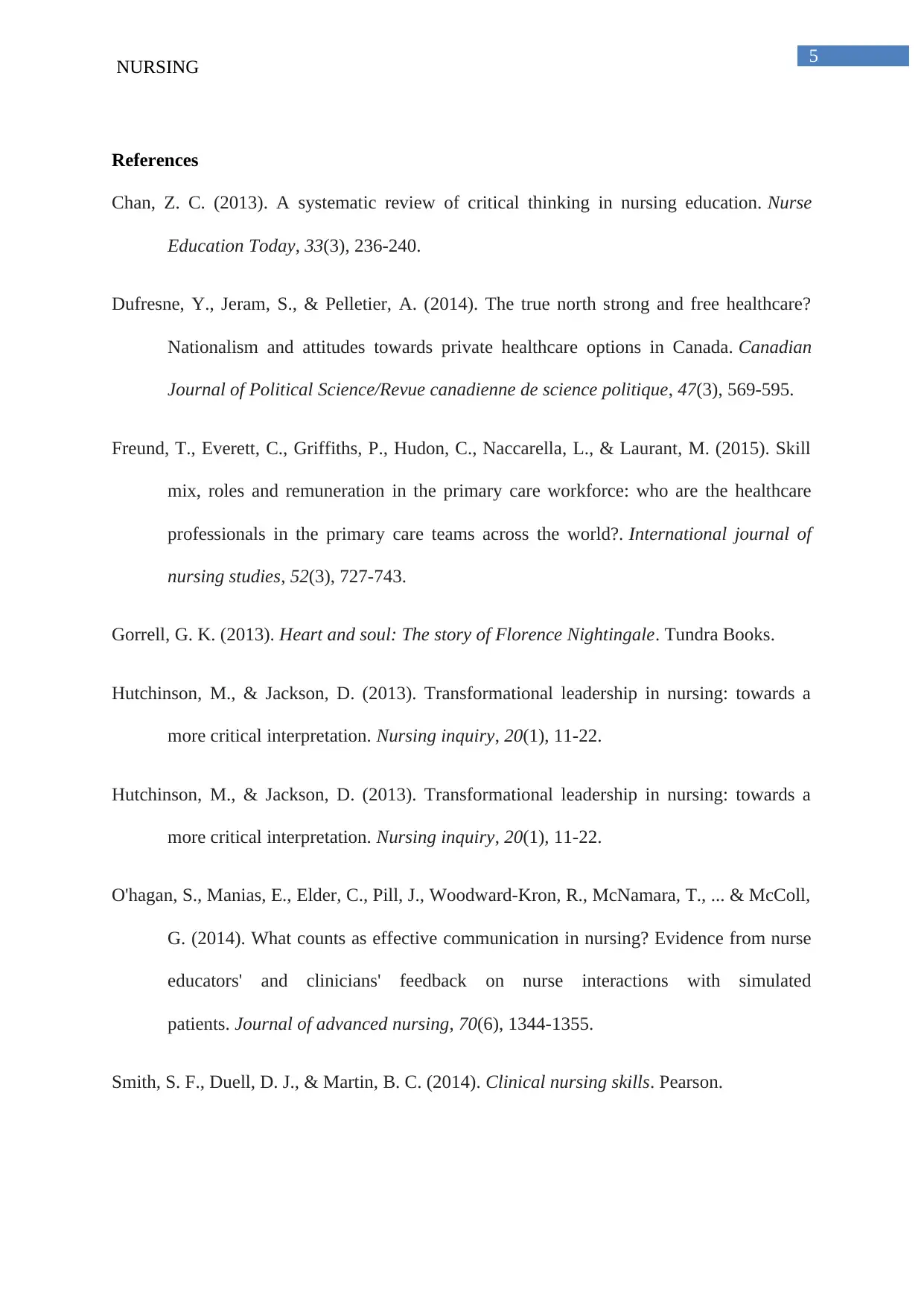
5
NURSING
References
Chan, Z. C. (2013). A systematic review of critical thinking in nursing education. Nurse
Education Today, 33(3), 236-240.
Dufresne, Y., Jeram, S., & Pelletier, A. (2014). The true north strong and free healthcare?
Nationalism and attitudes towards private healthcare options in Canada. Canadian
Journal of Political Science/Revue canadienne de science politique, 47(3), 569-595.
Freund, T., Everett, C., Griffiths, P., Hudon, C., Naccarella, L., & Laurant, M. (2015). Skill
mix, roles and remuneration in the primary care workforce: who are the healthcare
professionals in the primary care teams across the world?. International journal of
nursing studies, 52(3), 727-743.
Gorrell, G. K. (2013). Heart and soul: The story of Florence Nightingale. Tundra Books.
Hutchinson, M., & Jackson, D. (2013). Transformational leadership in nursing: towards a
more critical interpretation. Nursing inquiry, 20(1), 11-22.
Hutchinson, M., & Jackson, D. (2013). Transformational leadership in nursing: towards a
more critical interpretation. Nursing inquiry, 20(1), 11-22.
O'hagan, S., Manias, E., Elder, C., Pill, J., Woodward‐Kron, R., McNamara, T., ... & McColl,
G. (2014). What counts as effective communication in nursing? Evidence from nurse
educators' and clinicians' feedback on nurse interactions with simulated
patients. Journal of advanced nursing, 70(6), 1344-1355.
Smith, S. F., Duell, D. J., & Martin, B. C. (2014). Clinical nursing skills. Pearson.
NURSING
References
Chan, Z. C. (2013). A systematic review of critical thinking in nursing education. Nurse
Education Today, 33(3), 236-240.
Dufresne, Y., Jeram, S., & Pelletier, A. (2014). The true north strong and free healthcare?
Nationalism and attitudes towards private healthcare options in Canada. Canadian
Journal of Political Science/Revue canadienne de science politique, 47(3), 569-595.
Freund, T., Everett, C., Griffiths, P., Hudon, C., Naccarella, L., & Laurant, M. (2015). Skill
mix, roles and remuneration in the primary care workforce: who are the healthcare
professionals in the primary care teams across the world?. International journal of
nursing studies, 52(3), 727-743.
Gorrell, G. K. (2013). Heart and soul: The story of Florence Nightingale. Tundra Books.
Hutchinson, M., & Jackson, D. (2013). Transformational leadership in nursing: towards a
more critical interpretation. Nursing inquiry, 20(1), 11-22.
Hutchinson, M., & Jackson, D. (2013). Transformational leadership in nursing: towards a
more critical interpretation. Nursing inquiry, 20(1), 11-22.
O'hagan, S., Manias, E., Elder, C., Pill, J., Woodward‐Kron, R., McNamara, T., ... & McColl,
G. (2014). What counts as effective communication in nursing? Evidence from nurse
educators' and clinicians' feedback on nurse interactions with simulated
patients. Journal of advanced nursing, 70(6), 1344-1355.
Smith, S. F., Duell, D. J., & Martin, B. C. (2014). Clinical nursing skills. Pearson.
1 out of 6
Related Documents
Your All-in-One AI-Powered Toolkit for Academic Success.
+13062052269
info@desklib.com
Available 24*7 on WhatsApp / Email
![[object Object]](/_next/static/media/star-bottom.7253800d.svg)
Unlock your academic potential
© 2024 | Zucol Services PVT LTD | All rights reserved.





